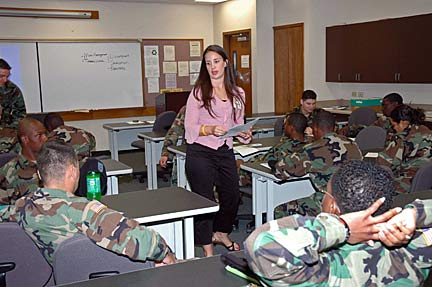
|
Readjusting
to life at home
Classes help soldiers deal with
problems that may arise after
being deployed for months in Iraq
Staff Sgt. Gerald Miller's daughter was born six months after he deployed to Iraq last year as a member of the 25th Infantry Division.
"She still cries when she sees me," said Miller, a squad leader with the 84th Engineer Battalion's Alpha Company. "I guess I am still a stranger to her. That was the only bad part of being deployed. I am still trying to get acquainted with her."
Like all of the 5,500 Schofield Barracks soldiers who left Wahiawa in January 2004, Miller was required upon his return to attend classes designed to help soldiers and their families readjust. Classes range from identifying the symptoms of combat stress to ways to deal with potential financial issues.
Miller, who spent a year in Balad, said that in the class called "Stress On and Off the Battlefield," he learned stress reduction and relaxation techniques.
"You learn not to hold onto your problems and to get help so you can get on with your life," he said.
Gene Tyson, program manager of the Tropic Lightning Academy, said the Army expects that 17 percent of the soldiers returning from a combat zone will have "persistent symptoms of post combat stress or post-traumatic stress disorder, and if they don't get help it will get worse."
"We're not therapists or counselors, but we are here to help the soldiers and their families to help recognize the symptoms," Tyson said.
Tyson said the two-hour class is designed not only to help the soldiers and their families recognize the symptoms of PTSD, but also to "help the soldier confront his own stress and give them ways to deal with that stress."
At Schofield, the Army has opened a soldier and family assistance center where a soldier or a family member can call at any time to get help.
In a recent anger management workshop, instructor Tara Lobaina made more than two dozen soldiers draw up a list of what makes them angry. These ranged from the military to ex-spouses to deployments and micromanaging supervisors.
"Anger can be a good thing," said Lobaina, "or a bad thing."
For instance, when dealing with incidents of road rage, Lobaina said that soldiers could do almost whatever they wanted to when they were driving while deployed in Iraq.
"Here, you have to abide with the rules of the road," she added, pointing out that in many cases only a soldier who has spent time in a combat zone may understand what was taking place.
"The soldier sitting next to you in the car probably knows why you reacting in such a manner, but you have to consider there is now a civilian sitting next to you or around you who may not understand."
She is one of 53 workshop instructors, all of whom have at least a master's degree, according to Tyson.
The Army will spend $750,000 this year to help more than 13,000 Schofield Barracks soldiers and their families with the adjustment process, said Tyson, a retired Army chaplain. It is training the Army requires all soldiers returning from a combat zone to help ease the transition.
The program the 25th Division uses is the same one Tyson managed from January to May 2004 at Fort Hood to help soldiers of the 4th Infantry Division make the transition from combat to civilian life.
[News] [Business] [Features] [Sports] [Editorial] [Do It Electric!]
[Classified Ads] [Search] [Subscribe] [Info] [Letter to Editor]
[Feedback]
